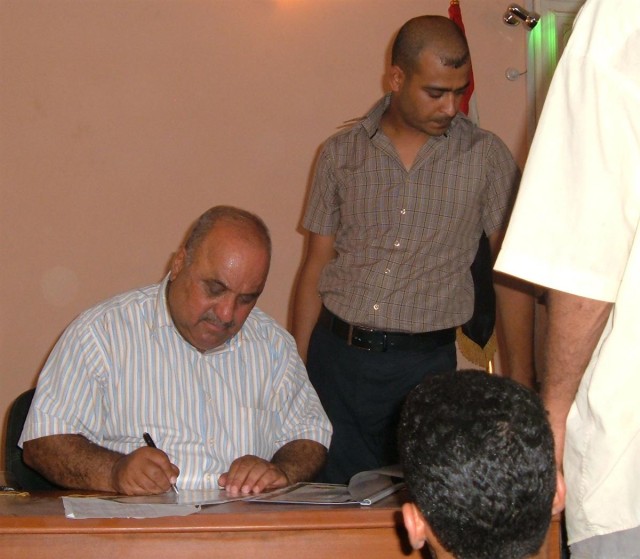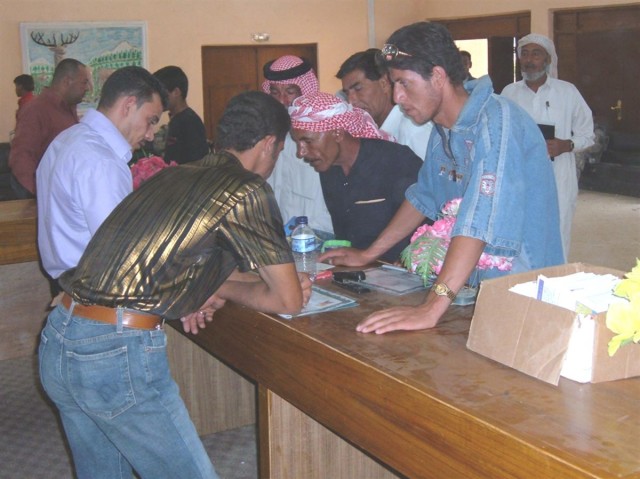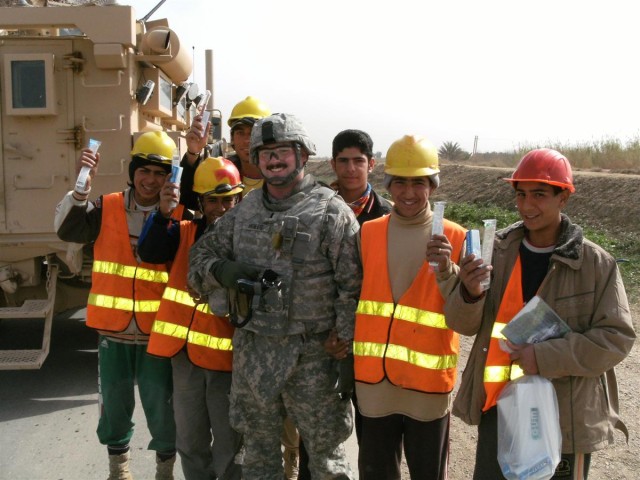BALAD, Iraq - One hundred twenty-five men sat patiently in the city hall chambers. The mayor and other government officials stood before them. One by one they waited for their names to be called. As each man was recognized, he stood up and walked to the podium to receive his graduation certificate here. These men joined the ranks of more than 300 graduates of the Civil Service Corps (CSC) concrete and asphalt training program. In addition to the ceremony, two other graduations were held in the Iraqi cities of Samarra and Ad Dujayl. The CSC program, coordinated by the 555th Engineer Brigade from Ft. Lewis, Wash., is just one of the brigade's ongoing missions designed to support Iraqi reconstruction and economic development. "I saw this as a chance to make a difference," said Navy Lt. j.g. William Moiles, engineer officer assigned to the 555th Eng. Bde., and CSC project coordinator since November 2008. Moiles, from Soldotona, Ark., explained the CSC was designed to provide students a chance to learn a trade. "We first targeted former members of the Sons of Iraq and the Concerned Local Citizens," said Moiles. As the two groups downsize, many were suddenly out of work. "We wanted to give them sustainable employment skills," he said. Over time, the program expanded to include area residents who were eager to learn and looking for employment. "We were paying these men to attend the training," said Moiles. "I structured it so their pay was directly related to their attendance and performance." Students could earn up to $300 a month while learning a skill and improving area roads at the same time. The money to pay the students and the cost of the program was provided by the Coalition forces from the Demobilize, Disarm and Reintegration (DDR) funds. Moiles also had to establish a relationship with the contractor providing the training. Instructors, supervision, equipment and materials were provided by Green Dream, an Iraqi construction company with offices in Baghdad and Balad. "This contractor was definitely behind the program. They even developed a system to reward the students with gifts for their performance," said Moiles. The size of this program and the numbers of work sites required assistance from additional engineer units. Elements of the 5th Engineer Battalion provided much needed support on the ground once the project was underway. First Lt. Cody West, the battalion contracting office representative, coordinated this support. "We had personnel from the 509th, 561st and 571st Engineer Companies involved," he said. Soldiers made weekly visits to CSC work sites in Samarra, Ad Dujayl and Balad. West, from Piedmont, Okla., explained the purpose of the visits, "Our Soldiers would check to see if the students had what they needed. We often filled requests for shovels or water. Also we were concerned with safety on the work site." Second Lt. Nathan Kim, of the 5th Eng. Bn., conducted many of the daily checks at the works sites. "We wanted to make sure things were done to standard, and see if the students needed any support," said Kim. "We definitely let the students know that we cared by bringing them water or tools when they asked for them." said Kim, from Orlando, Fl. Less than three months into this deployment Kim quickly learned the benefits of such programs. "This project reminds me of the saying, 'teach a man to fish and you'll feed him for life,'" said Kim. There were four phases to the program. Phase I started with basic road sanitation. In this beginning phase, students cleaned specific sections of the roads. "You could see the difference after they were done," said West. "Removing the trash and clearing the edges of the roadway made it difficult for insurgents to plant an Improvised Explosive Device (IED) in that area," said West. "Cleaning an area also improved local morale," he added. "It gave people a renewed sense of pride." In Phase II the students learned crater repair. This phase produced unexpected results. "We actually had students find IED's," said Moiles. After preparing the site, students were taught how to properly fill and patch the craters. As the students moved forward in the program, Phase III provided heavy equipment operation training. The students were given the chance to operate paving machines and other pieces of equipment. The fourth and final phase challenged the students with practical application of their newly learned skills. Phase IV tasked the students with paving two kilometers of a roadway. According to Moiles, the graduating students received a certificate with their level of proficiency based on performance in the program. "We certified the students at four different levels," said Moiles. The levels included laborer, craftsman apprentice, craftsman and foreman. "With these certifications the graduates could prove their training to a potential employer," added Moiles. One of the graduates, Ahmed Abrahim, spoke proudly about the course. "I have been in the program since the beginning and I have learned to work with concrete and asphalt," said Abrahim, from Al-Jozerate, Iraq left the CLC to learn a trade that would help him find work. Earning a foreman's certificate required students to demonstrate both technical proficiency and leadership potential. Khadom Falah possessed these traits. Falah, a former CLC member and is now a project manager. "During the training, I supervised 14 students," said Falah, from Al-Hodhery, Iraq. Following the graduation, the students had a chance to meet local contractors who were there to recruit new employees, to include personnel from the Balad municipality. City officials recruited twenty students for local road repair jobs. Reflecting over the past six months, Moiles is satisfied with the CSC program. "It has been an excellent experience to work with the Iraqis in this capacity and to have a chance to see the benefits of my efforts," said Moiles. The project manager from the Green Dream contracting company described the CSC as a great success. Salman Ahmed from Al-Shumary, Iraq was pleased with the results. "This will provide jobs and opportunity for the men who are not employed," he said. "We have rehabilitated these men for good jobs instead of working for the insurgents who have no pride. These men you see today, they have pride."
Paving the Road to Reconstruction
By 3d Sustainment Command Expeditionary public affairsJune 6, 2009






Social Sharing